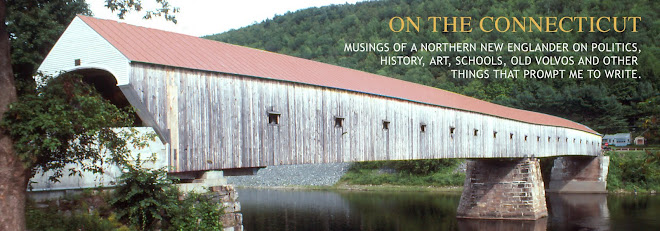My granddaughter, Annabelle, needed a replacement wheel for her car after hitting a curb. I volunteered to pick up a used one at a local junkyard. Because I spend so many hours a week banging on this keyboard, I jump on a good reason to get outside for a couple of hours.
I called the closest junkyard still in operation, a small family-owned business in the next town. A pleasant-sounding man told me they had a wheel. I hit the sleep key on my computer and headed out the door.
When I got there, the place seemed deserted. I went into the small but neat office where I found a man busily packaging auto parts. There was already a sizeable pile of boxes by the door.
‘Hello, there. I’m the one who called about the wheel,” I announced.
“99 Pontiac Grand Am. Right?”
“Yup.”
He picked up a walkie-talkie from the counter.
“Hey, Dennis. You out in the yard?”
“Yeah. What do you need?”
“Can you put your hands on a 14-inch Grand Am wheel--steel not alloy?”
“I’ll have to take one off.”
The pleasant-sounding man looked over at me. “You mind waiting?”
“Nope.”
“Dennis, pull one off and bring it down.”
He looked back at me again. “He’ll only be a few minutes.”
Then he went back to his work. After each part was packaged, he went to the computer and printed out a packing slip and label for the next one.
“Where are all these packages going,” I asked.
“All over. Mostly Mexico, South America and Africa.”
“That far?”
“Hell, there’s no money in local business any more. People trade in their cars before they break and a lot of those go overseas where there are no parts to fix ‘em. We do most of our business online these days. Everything’s paid by credit card and shipped UPS.”
I looked at the pile by the door and counted eighteen packages ready to go.
“You ship this many every day?”
“Pretty much.”
The phone rang. It was a nice day so I stepped outside. When Dennis appeared, I went back in and paid the pleasant-sounding man twenty dollars. On the ride home, I remembered a story that I had written more than twenty years ago.
I had to copy it from a 3.5-inch floppy disk and make a few corrections, but here it is:
To get back and forth to college, my son drives an old Volvo station wagon that doesn’t have the good sense to die gracefully. It has clocked more than a quarter million miles but is still fairly dependable.
The starter died the other day, and he couldn’t afford a new one. So we called around the local junkyards until we found a used one, then drove over to pick it up.
I hadn’t been to a junkyard for years, and things had certainly changed. The place we went wasn’t really a junkyard. It was more like a used auto parts store. We parked outside a ten-foot high chain link fence with barbed wire along the top and iridescent red, attack-dog warning signs every thirty feet.
The office was bustling with computer terminals, ringing phones, several casually dressed counter men and a good Saturday morning turnout. The room was Spartan but clean with several vending machines off to one side. The wall behind the long counter was covered with auto parts manufacturer posters.
We stood at the end of the line. At least the customers hadn’t changed much. They were still the same mix of shade-tree mechanics.
When we finally reached the counter, the man said they didn’t have a starter off the car.
“You can take it off yourself if you have your own tools or pay five dollars to have it removed.”
We didn’t have the tools so we had to pay the extra five bucks. He filled out a Part Removal Authorization form and handed it to us with brief but polite instructions.
“Up the center drive, seventeenth row on the right. Find what you want and give the pink copy to Skip. He’ll be in the yellow pickup.”
We found the part and Skip. He made short work of getting the starter off a battered, white four-door sedan with only 170,000 miles on the odometer. He put the pink copy on his clipboard and an initialed tag on the part. Everything neat and business-like.
As we walked back to the office, I explained to my son how junkyards had changed.
The junkyard I went to as a teenager was different. The only dogs were scruffy but friendly mutts. The only fences were stonewalls with sagging wooden gates.
Bob Wilson’s house stood on a neatly mowed knoll under an immense elm tree--an island in a sea of decaying automobilia. There were red geraniums planted in white-painted tires and a sandbox filled with Tonka trucks.
Everything outside of the yard was as overgrown as the yard was neat. Behind the house were a large cinder block garage, several sheds, a chicken coop, a couple of old school busses and truck bodies. Bob used the garage to dismantle cars. The rest provided storage for parts that were worth keeping out of the weather.
The cars sat in rows somewhat sorted by make and model. If you looked around, you could find cars you knew. Cars you had ridden in. Some were grim reminders of accidents involving people you knew. Others of awkward, adolescent experiments in love.
Each time I went, I checked to see whether the weathered old 1946 Pontiac that my mother drove when I was in grade school had eluded Bob’s torches. Or the worn-out 1949 Mercury that my cousin Phillip gave me when he graduated from law school. Sooner or later, the picked clean carcasses were dragged down back and burned. Then they were cut up for scrap.
Everything sat in waist deep hay with roadways worn down to the dirt between the rows of cars. In the summer, daisies and black-eyed susans bloomed between the cars.
Most of the cars lay with their bellies in the dirt, but a few lay helplessly on their roofs like overturned turtles.
Bob’s mobile tool bench was an ancient red panel truck with no doors, fenders or hood. In faded lettering on each side were the words “Coffee Time” surrounded by musical notes. The back end sagged under its burden of acetylene and oxygen bottles and overflowing toolboxes.
A huge vice was mounted on the homemade diamond-plate steel back bumper. At each corner was an outlandishly oversized tire. Because it never left the junkyard, it had no need for lights, horn or muffler. This was a vehicle that made no pretenses or excuses. What it lacked in finesse, it made up for in utility.
During the week, Bob worked hard in all weather dismantling and cutting up cars, loading the pieces on his big flatbed truck and delivering them to scrap metal dealers. On Saturdays, however, you could find Bob in the small office attached to the garage.
The office was furnished with two school bus seats and an oil-stained oak desk. Fancy hubcaps decorated the walls. A wood stove sat in front of one of the windows with a stove pipe running out through a piece of asbestos that replaced one of the window panes. A tool company calendar picturing a busty blonde whose bathing suit was printed on an acetate overlay hung on the inside door to the garage.
Bob sat in an old office chair with his feet up on the desk swapping stories with his customers. A car radio perched on the windowsill next to the desk. It was connected to a car battery on the floor below and an antenna wire hanging out the window. The baseball game was usually crackling out of the speaker lying next to the radio.
In this world, Bob was philosopher and sage. He passed out information with Yankee directness and frugality, generously peppered with four-letter words. A big man in soiled green coveralls, he was a walking compendium of cross-referenced parts from one make or model to another. And he seemed to know every car in his yard including which parts were still intact and most likely to work.
He ran an honest business and appreciated an honest customer. In fact everything pretty much worked on the honor system. Bob could tell you where you would most likely find the parts you needed. Then you could drive right in so you wouldn’t have to carry tools and parts back and forth. You stopped by the office on the way out to talk price. If the part was no good when you put it on, he’d give you another—no questions asked.
About this time, my son and I reached the office with the Volvo starter in hand. The cashier examined the tag and printed out a sales slip. We paid thirty dollars plus five for removal.
In the car on the way home, I was continuing my reminiscence when my son’s favorite band came on the radio. He turned up the volume and the conversation turned to getting the car going in time for his evening date.
I'm just a gigolo...
-
OK. The truth be told, I guess I was a gigolo at one time.
I wasn't trying to be. But a woman I had sex with paid me for my time. It
started cuz I missed w...


Karl,
ReplyDeleteBrings back memories of Iccabocci's Junk Yard in Weymouth ... I irst bought a 56 Ford Crown Victoria from a woman who got tired of getting it fixed. We then went to Iccabocci's. First we found a similar vintage Ford and pulled out a generator, an oil sender plug and then a radio speaker (a rear seat speaker was "the thing" to have in those days. We also needed a muffler and Iccy had a yard only tow truck similar to the one you described. He used it to tip over a car we spotted with a fairly new looking muffler. We then hacksawed that off.
All parts added up to $12 (a buck for the plug, $2 for the speaker, "give me $10 for the generator and muffler"...
There was a big time Junk Yard in Quincy where they pulled parts, catagoled them and even rebuilt them, but that would have been 3 or v4 times the cost. I had just invested close to 50% more in my first car .. Iccabocci's was the ticket !
Craig